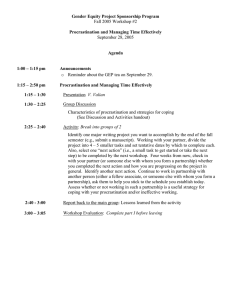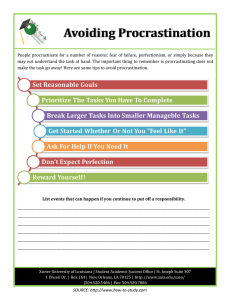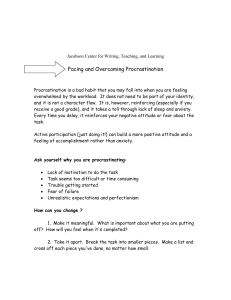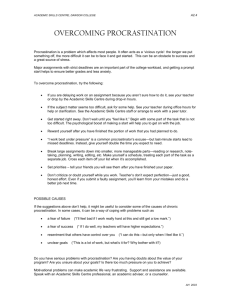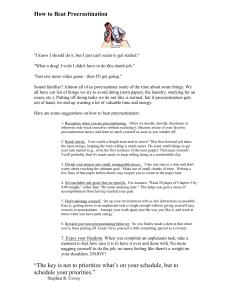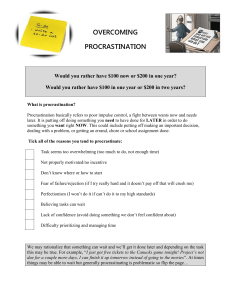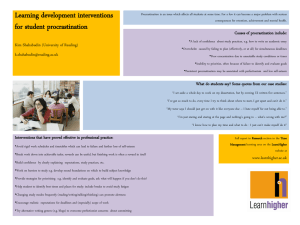301 Academic Skills Workshop Programme: Beating Procrastination What is procrastination?
advertisement
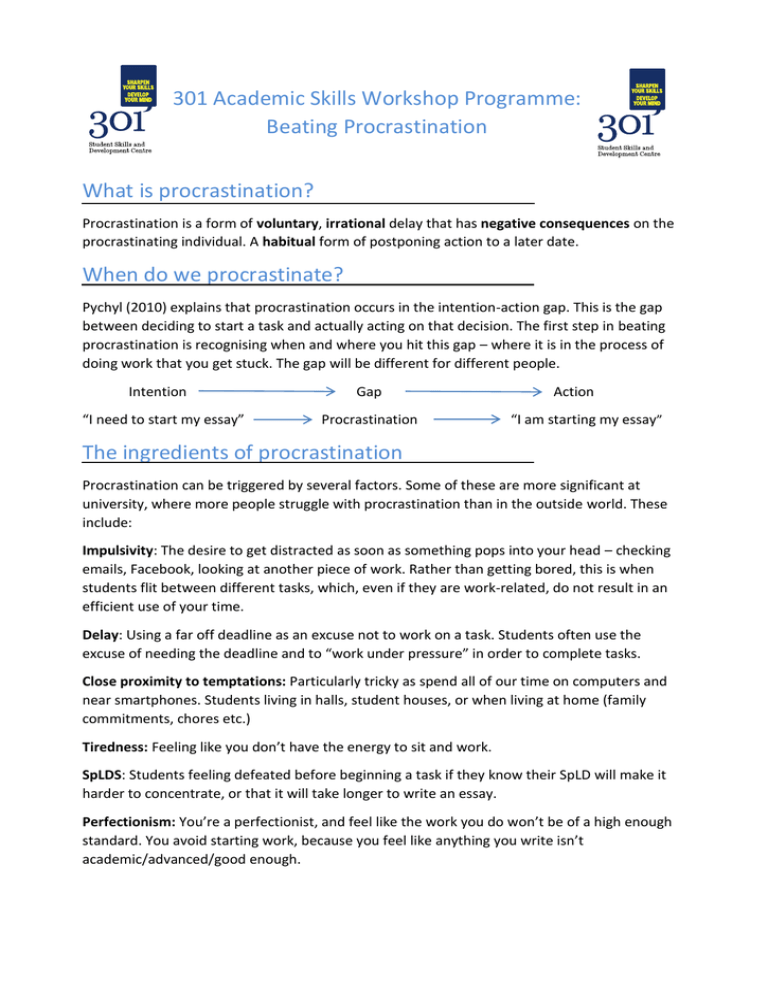
301 Academic Skills Workshop Programme: Beating Procrastination What is procrastination? Procrastination is a form of voluntary, irrational delay that has negative consequences on the procrastinating individual. A habitual form of postponing action to a later date. When do we procrastinate? Pychyl (2010) explains that procrastination occurs in the intention-action gap. This is the gap between deciding to start a task and actually acting on that decision. The first step in beating procrastination is recognising when and where you hit this gap – where it is in the process of doing work that you get stuck. The gap will be different for different people. Intention “I need to start my essay” Gap Procrastination Action “I am starting my essay” The ingredients of procrastination Procrastination can be triggered by several factors. Some of these are more significant at university, where more people struggle with procrastination than in the outside world. These include: Impulsivity: The desire to get distracted as soon as something pops into your head – checking emails, Facebook, looking at another piece of work. Rather than getting bored, this is when students flit between different tasks, which, even if they are work-related, do not result in an efficient use of your time. Delay: Using a far off deadline as an excuse not to work on a task. Students often use the excuse of needing the deadline and to “work under pressure” in order to complete tasks. Close proximity to temptations: Particularly tricky as spend all of our time on computers and near smartphones. Students living in halls, student houses, or when living at home (family commitments, chores etc.) Tiredness: Feeling like you don’t have the energy to sit and work. SpLDS: Students feeling defeated before beginning a task if they know their SpLD will make it harder to concentrate, or that it will take longer to write an essay. Perfectionism: You’re a perfectionist, and feel like the work you do won’t be of a high enough standard. You avoid starting work, because you feel like anything you write isn’t academic/advanced/good enough. Low self-confidence: Similar to being a perfectionist, you don’t feel like you can make any real progress on the task or that you have much chance of reaching your goals. Setting goals When trying to tackle procrastination, make sure you set yourself SMART goals: SPECIFIC: Make your goal as simple and specific as possible. MOTIVATION: What is your incentive to complete this task? What will be the rewards of reaching your goal? ACHEIVABLE: What makes your goal realistic? How will you meet it? RESULTS: What is the product of reaching your goal? What will this product, or the results, look/feel like? TIMESCALE: Set a timescale for the task. ORIGINAL GOAL: Revise Biology module. SMART GOAL: To make revision flashcards on all 12 lectures from my biology module ready for the exam on June 2nd. SPECIFIC: I will focus on lecture content and only make flashcards for revision. MOTIVATION: My reward is to complete this task by May 20th so I can go home for my birthday weekend before the exam. ACHEIVABLE: If I make revision flashcards for one lecture per night, I can aim to have this finished in 2 weeks. RESULTS: I will have a full set of flashcards for each lecture from biology that can be used for revision and exam preparation. TIMESCALE: The deadline for me to meet my goal is May 20th. I will schedule time to complete one lecture every night after dinner. 21 Day Challenge After setting your SMART goal, challenge yourself to spend a set amount of time on it every day, for 21 days. 1. Set timer on your phone to 30 minutes/an hour. 2. Work until the alarm. Even if you feel you aren’t making “real progress”, keep going. 3. After you meet your time target, cross the day off in red pen on your wall planner. 4. Do this every day for 21 days – your challenge is not break the chain! It takes around 21 days of repeated action to form a new habit – the longer you stick at this, the easier it gets. More strategies Create a positive workspace: Find where you work best and try to always work here – it’s important to be consistent and try to develop a study routine. Remove any distractions, and make sure you keep work and play separate. Cover your notes up, turn off the screen or leave your desk for 5 minutes every time you take a break. Use productivity software and apps: There are apps and online software to help you set goals, track progress and keep you from getting distracted on social media. Online sites such as Trello and Asana are great for having all of your goals and ideas in one place online. Pomodoro apps can help keep you on task during the 21-day challenge. Rewards and incentives: Reward yourself for meeting goals, no matter how small! When dividing a project into smaller, achievable tasks, try to match the size of the task with an incentive. Organising your notes might earn you a 5 minute Facebook break, while copying up notes from 3 lectures might deserve a 30 minute Netflix break. For more help… 1:1 sessions are available with our 301 Study Skills tutors to discuss any individual concerns you have about beating procrastination. These 30-minute slots can be booked through the 301 website or at the reception desk. Action Plan Your original goal:_________________________________ ________________________________________________ Your SMART goal:_________________________________ ________________________________________________ Over the next 7 days, I will start: • • • Reward for meeting these goals: __________________________ _____________________________________________________ Over the next two weeks, I will: • • • Reward for meeting these goals: __________________________ _____________________________________________________ By the end of the month, I will: • • • Reward for meeting these goals: __________________________ _____________________________________________________
